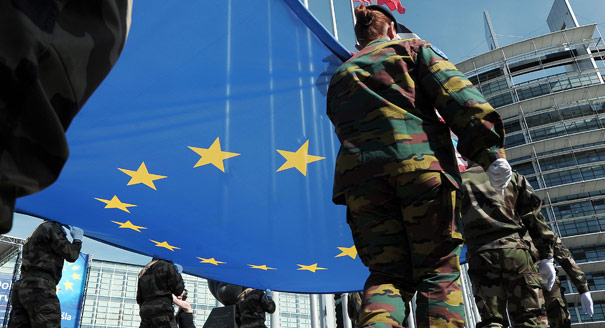Is the mere fact that an EU defense summit will be held in December already a success? Defense experts dealing with the EU's nearly defunct Common Security and Defense Policy (CSDP) like to believe so. They have gotten so used to the pitiful state of affair of CSDP that the attention generated by the upcoming summit feels like a rare ray of sunshine. At long last, there is a debate! Finally, some people will listen!
But what is it that really drives the EU security debate? What's left if you take the summit out of the equation? The sad answer is: not much.
The debate is clearly not driven by a proper strategic analysis of Europe's interests and the threats it faces. Plenty of documents and articles exist, and some member states, such as France, engage in serious thinking. But at the EU level, the strategic debate is weak, irregular, and deliberately small-scale.
The debate isn’t driven by threat perceptions, either. Europeans simply don't feel threatened much, at least not in a way that would make a debate about military security urgent. Terrorism is the only security issue Europeans will mention as part of their list of worries, and it is at the bottom of the scale.
Contrary to common belief, the defense debate isn’t driven by the necessity to cut public spending, either. Europeans are still grossly overspending on defense compared to what they actually get in return for their money. According to the European Defence Agency, they spend about 40 percent of what the United States spends on defense. “But we get only ten per cent of U.S. operational capability for all that money,” laments a senior EU official.
If budgetary considerations really drove the debate, spending patterns would change dramatically. If nations were seriously hard-pressed for cash, they could make enormous savings through pooling and sharing, liberalizing armaments markets, and coordinating military reform efforts. Very little of that is happening, so budgets clearly do not play a key role.
Many analysts had hoped that the shortcomings in operational capability that became so blatantly obvious during the Libya and Mali operations would be driving the debate. In the immediate aftermath of the deployments they did indeed receive some attention. But now, months and years later, they are no longer seen as an outrage. Europeans will say that the era of big operations, Afghanistan style, is over. This sentence has many dimensions, but one of its meanings is: from now on, we will probably not need this stuff anyway. So military shortcomings clearly also do not drive the debate.
Finally, not even the risk of losing NATO’s security umbrella at some point in the future seems to stir Europeans much. Perhaps Europeans believe that America will always make up for European weakness within the Alliance. Perhaps they don't care whether America stays or goes. Either way, fear of losing Europe's external security insurance policy is not as widespread as it should be.
What drives defense analysts and military experts mad is that all of the arguments given here are highly valid, immediately applicable, and often scientifically watertight. But they still won’t fly. The defense debate in Europe is one of Severe Valid Argument Failure (SVAF), one of the worst diseases that can befall any political discourse.
The key to understanding SVAF in the defense field is the factor of time. The problem of all the arguments listed above is that they will play out in the medium and long term (with the possible exception of the operational capabilities shortfall). The bitter truth is that in the great European crisis, nobody has the time for long-term arguments. The euro needs to be saved, growth needs to be stimulated, elections need to be survived. To make matters worse, Europe will fall into a political coma for most of 2014 because of the European elections and the leadership changes in all major institutions, including NATO.
The structural problem of the EU defense debate is not that there is a lack of valid arguments or a lack of urgency. The problem is that long-term arguments don't work in a short-termist political environment. There is only one force capable of breaking out of this logic, and that's political leadership (motivated perhaps, as I mentioned in an earlier blog, by issues of national ambition). But most of that rare commodity is absorbed by other issues these days.
In the absence of some unexpected, grand-scale security emergency, don't expect the issue of defense to matter to Europeans any time soon.






